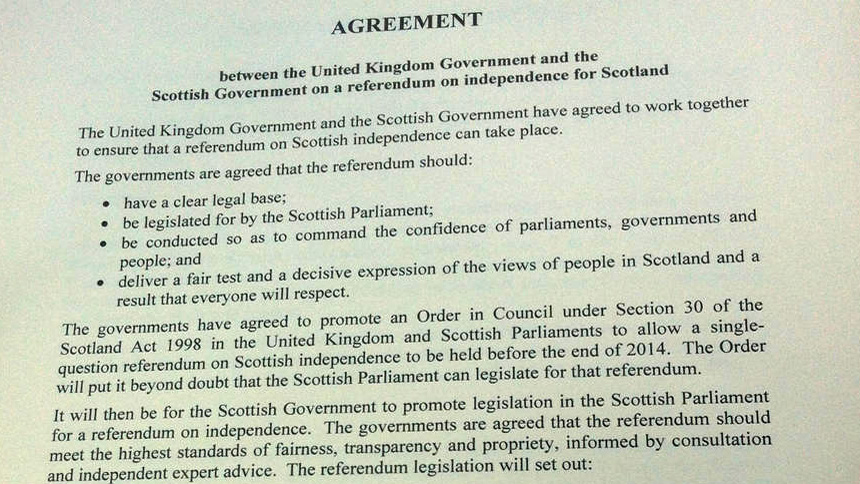Cameron and Salmond hail Scottish referendum deal
David Cameron and Alex Salmond are united in support for today’s deal on a Scottish independence referendum, with Scotland’s first minister hailing it as “a very substantial gain” for his country.
Mr Cameron told Channel 4 News Political Editor Gary Gibbon: “This is the right decision for Scotland, but it is also right for the UK, that there is one simple, straightforward question about whether Scotland wants to stay in the UK or separate itself from the UK.”
He said he believed the Scottish people would vote to keep the United Kingdom together. “We are better off together, we’re stronger together,” he said.
He said allowing a referendum was “showing respect” to the people of Scotland.
And the prime minister warned: “If independence goes ahead, it will be the end of devolution. All those who want to see not only the status quo but any further devolution from the United Kingdom to Scotland must vote to stay in the United Kingdom.”
‘Satisfactory agreement’
SNP leader Alex Salmond told Gary Gibbon that the deal was “a very satisfactory agreement for Scotland”. He said it was an “agreed process by which Scotland can choose, if it so wishes, to become an independent country”.
He said the fact that the outcome of the referendum would be respected by the British and Scottish governments was “a very substantial gain for Scotland”.
Asked about his emotions when he saw Scottish Olympic athletes draped in the union jack, the SNP leader said: “My emotion was entirely friendly. Whey were competing as part of the British team.”
Mr Salmond went on to ponder how David Cameron would respond at the sight of the same athletes draped in the Scottish saltire at the Commonwealth Games.
“Will David Cameron be having a dicky fit just because they’ll be wearing a saltire. Perhaps he will.”
Private meetings
The deal signed by Mr Cameron and Scotland’s first minister grants Holyrood the power to hold a historic referendum on independence.
The ballot is expected to be held in autumn 2014, with 16- and 17-year-olds being allowed to vote.
Private meetings between the two governments have covered contentious issues about the question on the paper, expected to be limited to a single yes/no option.
Proposals for a second question on further devolution, short of independence, were firmly opposed by the UK government.
Read more: Scottish referendum plan emerging

Above: part of today’s Scottish independence referendum document, signed by David Cameron and Alex Salmond, as tweeted by David Cameron
Today’s meeting should determine a technical measure known as a “section 30”, which passes power from Westminster to Holyrood to legislate on the referendum.
Mr Cameron has pledged that keeping the United Kingdom together is his number one priority.
In a speech later he is expected to say: “This marks the beginning of an important chapter in Scotland’s story and allows the real debate to begin.
“It paves the way so that the biggest question of all can be settled: a separate Scotland or a United Kingdom? I will be making a very positive argument for our United Kingdom.
“It is now up to the people of Scotland to make that historic decision. The very future of Scotland depends on their verdict. It is that important. This agreement delivers the people’s referendum.”
The agreement will see Scotland take an important step toward independence, and the means to create a fairer and more prosperous Scotland. Alex Salmond
Mr Salmond secured a mandate to hold the referendum by winning an unprecedented majority with his Scottish National Party at Holyrood last year.
He said: “The people of Scotland gave the Scottish government a clear mandate in last year’s election to hold a referendum on Scotland’s future in 2014.
“The agreement I expect to reach with the prime minister is one which ensures that not only is the referendum made in Scotland, but that the fundamental right of the people of Scotland to choose their own future is respected by all.
“The agreement will see Scotland take an important step toward independence, and the means to create a fairer and more prosperous Scotland. I look forward to working positively for a yes vote in 2014.”